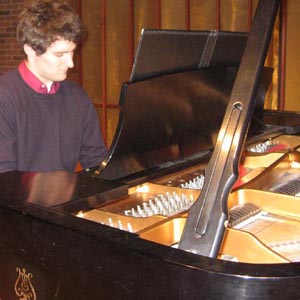

Venture Boldly

 Knox senior Sean Carmichael has a passion for music. The music major claims that, "blues was a precursor to both jazz and rock." When writing about and teaching music, he says he feels like he can use a Bach example right next to a John Coltrane example. "I want to investigate how blues, jazz and rock compositions possess similarities in their musical language despite their obvious differences in timbre and historical context."
Knox senior Sean Carmichael has a passion for music. The music major claims that, "blues was a precursor to both jazz and rock." When writing about and teaching music, he says he feels like he can use a Bach example right next to a John Coltrane example. "I want to investigate how blues, jazz and rock compositions possess similarities in their musical language despite their obvious differences in timbre and historical context."
It all started when Carmichael was hired to proof a manuscript for Jeremy Day-O'Connell, assistant professor of music at Knox. "I was reading the manuscript and was curious about the pentatonic scale [the black keys on a piano keyboard]. So, I started reading more about it. A lot of what I had read was more practical than theoretical. I decided I wanted to do some formal research on the pentatonic scale in jazz."
He says he can't predict what is going to happen, because music theory describes the music of the past in a systematic way. "The future is for composers and the past is for theorists. Anyone can compose a piece of music that changes the course of musical history, but they are the composers; as a theorist, my job is to systematically evaluate that piece in the context of musical history."
So jazz and rock sort of share a language? "That says something about the cultural context of both jazz and rock. Culturally speaking, the two genres are trying to make different statements, but they are using similar language to do it, language derived from the blues."
His own musical talents date back to elementary school, "I picked up the bassoon in fifth grade and loved it," he says. Other instruments followed and by high school, he was playing in a band. "We had gigs in churches, restaurants and bars." And, at Knox he maintained a quick tempo and learned the upright bass, saxophone, and vibraphone.
Surprisingly, Carmichael had calculated an academic career in actuary science followed by an MBA. With his already proven background in music, he tested out of the Music Theory I class at Knox, so his first music class was Music Theory II with Day-O'Connell. "His class applied to real music. That class was the turning point for me. My life pretty much changed on a dime."
Carmichael took to music theory with great fervor and now the objects of his scrutiny are pitch, timbres, rhythms and phrases. "Actuarial science is not that interesting to me. I had always had diverse interests and wanted to attend a school at which I could pursue several subjects at once. Eventually I decided that I could pursue a career in music and do something important with my life."
Ultimately, he says he wants to teach at a university or college, teaching music theory and sharing his philosophy about comparing genres.
He relishes the memory of the 2008 election night and melodiously describes the events of the evening. "Barack Obama clinched the presidency. There was an enormous Knox mob. We were chanting. We went into town. We shared the struggle of our country and the hope for change."
He was one of a chorus of students that played music outside of the Center of Fine Arts building at 1 a.m. "It was an impromptu concert. I don't think that would happen at another school. It was a Knox thing."
So, what does he mean a Knox thing? "Oh, its like Louis Armstrong's reply to the question ‘What is Jazz?': "If you have to ask, you'll never know." That is the Knox thing."
Carmichael has also been a member of the Knox College Choir, Knox College Chamber Singers, the Knox Jazz Ensemble, and the Knox Cherry Street Combo. He is a founding father of Sigma Chi Lambda Alpha Chapter, a member of the Order of Omega, and a Ford Foundation Research Fellow.
Published on March 04, 2009